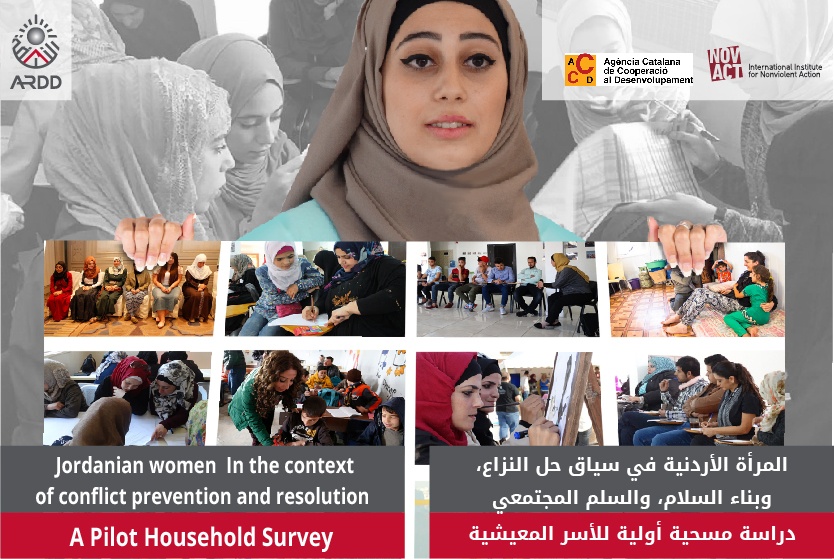Jordan has taken several steps towards enhancing and expanding the role of women in peace-building through capacity building of competent gender sensitive cadre in the humanitarianresponse field. Which comes inline with the (2018-2021) Jordanian National Action Plan (JONAP), which aims to advance the implementation of UN Security Council resolution 1325 on Women, Peace and Security (UNSCR 1325), and its subsequent resolutions. This National Action Plan was developed to respond to the political and security related developments and is in line with “Jordan’s commitments to promote and respect human rights, justice, equality and participation—all of which are embodied in various national frameworks, such as The National Strategy for Jordanian Women (2013-2017) and The Comprehensive National Plan for Human Rights (2016-2025).
This research comes as part of the project “INDICASERE: Research, Capacity building, Awareness and Resilience of the Syrian host communities,” conducted by Arab Renaissance for Democracy Development ARDD, in cooperation with NOVACT, International Institute for Nonviolent Action, and funded by the Catalan Agency for Development Cooperation (ACCD). The report aims to highlight important challenges facing women regarding their role in society in general, and their role in promoting community security and stability in conflicts and crises in particular. Economic factors and economic violence are among the most important obstacles women face in exercising their desired role in this regard.
In the context of diagnosing and investigating the prevention of violent extremism and the resolution of conflicts, peace building and social cohesion, ARDD undertook methods of quantitative and qualitative analysis. As an initial qualitative needs assessment prior to the survey, ARDD held focus group discussions in the three localities (Zarqa, East Amman and Karak). These discussions heeded a great deal of insight into the mindsets of women in these communities, which included reflections on subjects such as economic challenges, the negative stereotyping of women, environmental factors that contribute to conflict or violence, and the interplay of power relations and dynamics on various levels.
The quantitative component of the research was centered on a survey that aimed to establish how women in Jordan are enabled to or deterred from playing a positive role in conflict resolution, home and community peace building, and social resilience/cohesion within the context of the prevention of violent extremism (PVE). The research builds on the theory that the women’s well-being and security are what enhance their ability to exercise their role. These factors are, primarily: social Relationships and social participation, mental and physical health, emotional wellbeing and inner contentment, bodily integrity, work, meaningful daily activities, feeling of self-worth, economy and resources, financial material wellbeing, independence, sense of belonging, personal safety, quality of environment, home and local community, laws and policies, culture and societal attitudes, and beliefs. It was conducted through a household survey among a pilot sample of 1228 single and married women ages 15-49 in East Amman, Zarqa and Karak.
The research found that the vast majority of women surveyed believe that the most influential factors are economic factors, such as lack of employment opportunities, low income, widening the gap between the poor and the rich, and the spread of favoritism, religious factors such as lack of adherence to true religious teachings, widespread misinterpretation of religious teachings in schools, social factors represented by the lack of tolerance, non-acceptance of diversity, widespread hate speech, as well as factors related to family relations, such as family imbalances and disintegration, and domestic violence.
With regard to creating an enabling environment for women, only 10% of women believe that the living conditions surrounding them enable them to achieve their aspirations and in terms of economic participation 81% of the women targeted by the research state that they suffer from unemployment. As the research shows, women’s civic and public participation is low. With regard to women’s perception of themselves and society’ s view, which determines their motivation and willingness to exercise their role in the community, the research showed that 83% of the women targeted believe that women are emotional by nature and have weak personality.
Finally, the report emphasizes the important role of women in community-based peace-building efforts and the prevention of violence. It also calls for concerted efforts by the State, civil society and non-governmental organizations, to strengthen alliances based on grassroots localized humanitarian action to win support, and to facilitate joint action to enable women’s access to justice, which is a prerequisite for women to attain all their rights, and to enable them to access resources and opportunities by ensuring her equal participation economically and in decision making. In addition, the report calls to enhance women’s confidence and self-image, and recognize the role of economic and political empowerment in reducing all forms of violence. In addition to taking advantage of social media’s potential in spreading messages, raising awareness in these regards.


